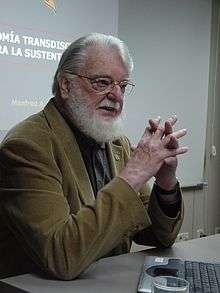Manfred Max-Neef
| Artur Manfred Max-Neef | |
|---|---|
 A snapshot of Manfred Max-Neef taken on 18 January 2007 | |
| Born |
26 October 1932 Valparaíso, Chile |
| Nationality | Chilean |
| Scientific career | |
| Fields | Economics |
| Institutions | University of California, Berkeley |
Artur Manfred Max-Neef (Spanish pronunciation: [ˈmamfɾeð ˈmaks]; born 26 October 1932) is a Chilean economist of German descent, Max-Neef was born in Valparaíso, Chile. He started his career as a professor of economics at the University of California, Berkeley in the early 1960s. He is known for his taxonomy of fundamental human needs and human scale development.
Career
Max-Neef traveled through Latin America and the United States, as a visiting professor in various universities, as well as living with and researching the poor.[1] He worked with the problem of development in the Third World, describing the inappropriateness of conventional models of development that have contributed to poverty, debt and ecological disasters for Third World communities.
In 1981, Max-Neef wrote From the Outside Looking In: Experiences in Barefoot Economics, a narrative of his travels among the poor in South America. In the same year, he founded the Centre for Development Alternatives (CEPAUR).[2]
In 1982, Max-Neef won the Right Livelihood Award for his work in poverty-stricken areas of developing countries. Max-Neef ran for President of Chile as an independent in the 1993 election. He achieved 4th place, with 5.55% of the vote.
In 1993, Max-Neef was appointed rector of the Universidad Austral de Chile in Valdivia. He served in that position for eight years. Max-Neef is a council member of the World Future Council. He is also affiliated with the European Academy of Sciences and Arts, the Club of Rome, the New York Academy of Sciences, and the Leopold Kohr Academy of Salzburg (an institution founded by Leopold Kohr).
Among his honoraria are the University Award of Highest Honour (Soka University); Doctor Honoris Causa (University of Jordan); Chile's National Prize for the Promotion and Defense of Human Rights; and the Kenneth Boulding Award, the highest honour bestowed by the International Society for Ecological Economics (August 2008). On 10 May 2009, he received an Honorary Doctorate in Humane Letters and was Commencement Speaker to the 158th Graduating Class of Saint Francis University.
Bibliography
- Max-Neef, Manfred A (1992). From the Outside Looking In: Experiences in Barefoot Economics (PDF). Dag Hammarskjöld Foundation. p. 208. ISBN 1-85649-188-9. Archived from the original on 2012-10-21. Retrieved 2015-05-22.
- Max-Neef, Manfred A; Antonio Elizalde; Martin Hopenhayn (1991). Human Scale Development (PDF). The Apex Press. p. 114. ISBN 0-945257-35-X. Archived from the original on 2013-03-19. Retrieved 2015-05-22.
- Max-Neef, Manfred A; Paul Ekins (1992). Real-Life Economics: Understanding Wealth Creation. Routledge. p. 432. ISBN 0-415-07976-4. Retrieved 2011-02-15.
References
- ↑ Max-Neef, Manfred A; Antonio Elizalde; Martin Hopenhayn (1991). Human Scale Development (PDF). The Apex Press. p. 106. ISBN 0-945257-35-X. Archived from the original on 2013-03-19. Retrieved 2015-05-22.
- ↑ "Manfred Max-Neef – Chile". World People's Blog. Retrieved 2011-02-15.
External links
- Official website
- Works by or about Manfred Max-Neef in libraries (WorldCat catalog)
- Right Lifelihood Award website
- World Future Council
- Max-Neef on Human Needs and Human-scale Development
- El desarrollo a la medida humana from Desarrollo y Cooperación (March/April 2002) (in Spanish)
- Economic Investigation by Hermann Max, Manfred Max-Neef's father
- Max-Neef: U.S. Is Becoming an "Underdeveloping Nation", a video interview by Democracy Now!